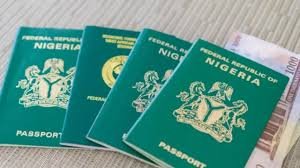In a nation where obtaining a passport was once synonymous with bribes, extortion, and endless delays, the recent overhaul of Nigeria’s passport application process marks a historic turning point. With the introduction of a fully automated system, the Nigerian Immigration Service (NIS) is transforming what was once a harrowing experience into a streamlined procedure. In this report, Gom Mirian highlights personal accounts that illustrate this seismic shift in the passport application landscape.
A Troubling Past: The Struggles of Obtaining a Passport

For years, obtaining a passport in Nigeria was synonymous with frustration. Stories of extortion, bribery, and bureaucratic red tape were rampant. Applicants faced long queues and arbitrary fees, leading to a pervasive distrust in the system. Andrew, a young man who applied for his passport in 2019, encapsulated this struggle.
Andrew’s experience epitomises the chaos that plagued the passport application process just a few years ago. On a seemingly ordinary Tuesday in 2019, he entered the NIS office along Nnamdi Azikiwe International Airport in Abuja, unaware of the seven-month ordeal that awaited him.

After filling out the forms, on knowing the reason for the quest for a passport which was urgent, an immigration officer there told him to pay 70,000 naira ($42.68) for an expedited passport or wait six weeks – like others. “Six weeks sounded like a reasonable time to me so I paid 26,000 naira [$16.01] because I was not in a hurry to get the passport because I still had three months to travel,” the 27-year-old told AHR, expecting a straightforward journey.
However, as weeks turned into months, Andrew found himself navigating a web of frustrations. When he inquired about his passport in November, six weeks later, he was told by the officer that he would need to pay an additional N10,000 naira to secure a passport booklet.

“I was getting worried already … because the Fellowship I was to attend was already at hand, and the officer that promised me my passport in two days left called me that I would need to add an extra N10,000 to enable him to secure a booklet from his colleague,” he said. “After going back and forth I spent about N120,000 to get the passport at the third end.”
His tale is not unique; it mirrors the experiences of countless Nigerians who faced extortion and corruption during the application process.
In 2017, the NIS attempted to combat these issues by banning cash payments, aiming to eliminate middlemen. Yet, these measures only deepened the crisis, with a 2021 survey revealing that less than 10% of Nigerians possessed a passport due to the arduous application process.
The Dawn of a New Era
To change this horrible narrative, the Minister of Interior, Dr. Olubunmi Tunji-Ojo launched the first online portal for passport applications in Abuja on January 8, 2024, catering to both international and Nigerian applicants.

Nigerians who have recently gone through the passport application process are witnessing significant changes. “I applied for my passport online and received it in under three weeks,” said Lagos resident Michael Adeyemi. “It used to be a nightmare, but now I can track my application from home without ever needing to visit the immigration office.”
Another user, Simbyait Musa, who resides in Abuja, echoed this sentiment. “I remember waiting for months, only to be asked for extra payments at the office. This time, I filled everything out online and paid the official fee. It felt so secure,” she explained.
For many, these reforms mean not just time saved, but a significant reduction in the stress and anxiety that once accompanied the process. “I can’t believe I got my passport without having to bribe anyone,” noted Chinedu, a student who recently returned from studying abroad. “It’s like a weight has been lifted off my shoulders.”
Expert Insights: From Chaos to Order
Dr. Olusola Sunday, an expert on immigration policies, offered insights into the previous state of passport processing in Nigeria. “Historically, the passport application process was riddled with delays and corrupt practices. Applicants often faced extortion, long queues, and the need for unofficial fees,” he explained. “This led to a pervasive distrust of the system.”
The introduction of online applications, biometric data capture, and a more structured fee payment system have significantly mitigated these issues. “Now, applicants can submit their information from the comfort of their homes. This has not only reduced face-to-face contact but has also minimised opportunities for corruption,” Dr. Sunday added.
The Technology Behind the Transformation
The NIS has implemented advanced technologies, such as a centralised database and a user-friendly online portal. These tools enable applicants to monitor their application status in real time and receive updates via SMS or email. The biometric system ensures that each applicant is uniquely identified, which helps to curb identity theft and fraud.
The Global Perspective: Comparing Passport Acquisition
When compared to other countries, Nigeria’s reforms mark a significant leap forward. For instance, in countries like Canada and Germany, the passport application process is primarily digital, allowing citizens to apply online without visiting a physical office. This seamlessness is now becoming a reality in Nigeria, albeit with some cultural resistance.
Nigerians abroad also share their perspectives on these reforms. “It’s about time Nigeria caught up with the rest of the world,” said Ijeoma Nwankwo, a Nigerian expatriate living in the UK. “I had to go through so much just to renew my passport five years ago. Hearing about these new procedures gives me hope.”
Samuel Eze, residing in the US, expressed cautious optimism: “I hope these reforms are sustainable. We need to ensure that the old ways don’t creep back in. The government must keep holding officials accountable.”
The Dark Side of Progress: The Persistence of Corruption
Despite the advancements, some Nigerians still cling to old habits. Many believe in “sharp sharp” methods—shortcuts to expedite the process, often involving unofficial intermediaries. “I know it’s wrong, but sometimes it’s the only way to get things done quickly,” confessed Gloria Okeke, a job seeker who recently faced delays. “I went through someone who said they could help me get my passport faster.”
This mentality poses a significant challenge to the reforms. Dr. Sunday highlighted the importance of changing this mindset: “Citizens need to understand that shortcuts only perpetuate corruption. We must promote the idea that the official process is efficient and reliable.”
To effectively combat the “sharp sharp” mentality, he suggests a multi-faceted approach. “We need continuous public education on the benefits of the new processes,” Dr. Sunday advised. “Community leaders and influencers can play a vital role in reshaping perceptions about the legitimacy and efficiency of the system.”
Also, implementing stricter penalties for corrupt practices among immigration officers can deter collusion with applicants seeking shortcuts. “Accountability must be enforced at all levels,” he stressed.
A Bright Future for Nigerian Passports
As the NIS continues to refine its processes, the hope is that Nigerians will embrace the new systems wholeheartedly. The reforms are not just about obtaining a passport; they represent a broader shift toward transparency and efficiency in government services.
“I feel proud to be Nigerian when I hear about these changes,” Samuel Eze added. “It shows that we can improve and build a better future if we all play our part.”
In this new era of immigration reform, the potential for a streamlined, corruption-free passport application process is within reach. Yet, it requires a collective effort from both the government and its citizens to ensure that progress is sustained, and corruption is eradicated once and for all.



